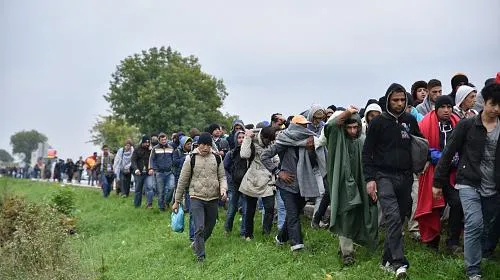BELGRADE/SERBIAN-CROATIAN BORDER (Oct. 21, 2015) — The situation is deteriorating rapidly for refugees and migrants in the Balkans. Numbers of people arriving are increasing; winter is approaching and fewer open border routes are available for people to continue their journey into Western Europe.
“I have worked in Somalia and Yemen and some of the worst humanitarian crises in the world and the situation here on the Serbian border is comparable to those. People have little clothing, food or water. Many are forced to sleep in the open. Paths are muddy and covered with waste. The fact that is it in Europe is a tragedy and embarrassment” says Iljitsj Wemerman, the CARE Emergency team leader.
The onset of winter across the region where temperatures drop to below freezing is a serious and potentially life-threatening worry, with many of those arriving unprepared for the cold. The biggest needs are warm blankets and clothes. Proper shoes are also a critical need as many have made the journey is flimsy trainers and flip flops.
“Most of those crossing from Serbia into Croatia have already traveled through at least five countries to reach this point. They have travelled weeks or even months on foot, buses, trains and boats. They are tired, very cold and increasingly weak and sick. We have seen illnesses such as respiratory tract infections, diarrhea and even some cases of hypothermia and pneumonia. There is an imminent risk of fatalities” adds Wemerman.
Around 5-6,000 people are thought to be arriving in Serbia daily at the moment on their way to Croatia. Governments and aid agencies are unable to keep up with the volume of new arrivals. While initial arrivals in September and the beginning of October were mainly men, CARE is now seeing an increasing number of women and often very young children. They are more vulnerable to safety and security risks, such as sexual and gender-based violence.
Adding to the stress for refugees and migrants is the unpredictability of available routes and places to rest. Borders are being sporadically opened and shut, creating bottlenecks and frenzies. There are many instances of families being split with parents missing one or more child between the two countries. CARE urges the safe and predictable movement of people across borders by Governments in the region.
CARE is working through partner organizations using a network of volunteers to provide 24-hour assistance seven days a week to the new arrivals. This includes packages with dry food, drinks, wet wipes, clothes, blankets and materials specifically for women, such as sanitary materials and baby diapers. A trailer offering mobile phone charging and free WiFi has been set up, as social media and phones are a key way for people to keep in touch on the move. In the coming weeks CARE will scale up assistance with provision of water and sanitation, as well as, shelter.
It is important to note that refugees arriving in Europe still only represent a small percentage of the people affected by the Syrian Crisis and other crises. The vast majority remain in Syria, Jordan, Lebanon and Turkey, where humanitarian operations are seriously underfunded and continuous cuts are being made to refugee programs making life impossible for those living there.
-ENDS-
Media contact
Holly Frew, +1.770.842.6188, hfrew@care.org
About CARE
Founded in 1945, CARE is a leading humanitarian organization fighting global poverty. CARE has more than six decades of experience helping people prepare for disasters, providing lifesaving assistance when a crisis hits, and helping communities recover after the emergency has passed. CARE places special focus on women and children, who are often disproportionately affected by disasters. To learn more, visit www.care.org.

